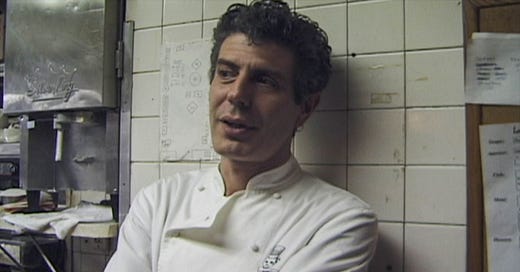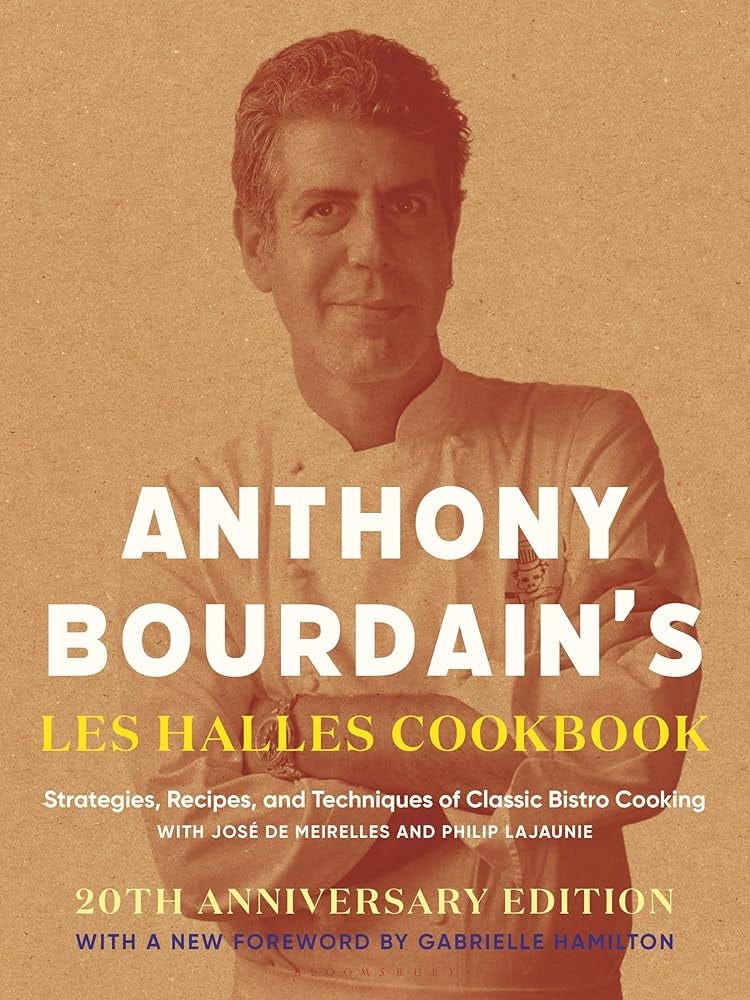To those that might not remember, yes, the French fries at the restaurant he worked at were as good as Anthony Bourdain said they were in his 2004 Les Halles Cookbook. I remember that quite specifically because the city was dealing with such a fries crisis in the early-aughts, that more than a few people claimed the only comparable oil-soaked spud was to be found at a Five Guys location. Now, I have no problem eating at the burger franchise once or twice a year, but there was something sad about how so few restaurants had really killer fries for so long. They were just a side, an afterthought.
Now, I’m not going to say Bourdain and Les Halles changed that, but I do think there’s plenty of time between the cookbook coming out and today to notice that in 20 years, both the humble French fry as well as the French-brasserie style like at the joint where the late author and TV star first made a name for himself have both thrived. Places take their fries more seriously, and the number of French places from the newly-revamped Le Veau D’Or to Libertine, to a new generation of fans of the Odeon shows it. If Bourdain and Les Halles didn’t start that trend in motion, they certainly had a hand in it.
I took a lot away from reading the new 20th-anniversary edition of Anthony Bourdain’s Les Halles Cookbook besides the chef and restaurant’s place in the history of New York City dining. Simply put: it’s one of the best American French bistro-style cookbooks you’ll ever find, but the first thing I went for when I opened my copy was Tony’s lesson on how to make French fries his way. Thanks to the nice folks at Bloomsbury, I’ve got Bourdain’s words and recipe here for anybody who wants to try to make fries at home. Perhaps you’re making Paul Newman’s burger and want something perfect on the side, or maybe you’ve had a few-too-many lackluster fries and you want to try your hand at making better ones. Whatever it might be, your old pal Tony has you covered.
(And if you like this recipe, maybe you’d consider signing up for a paid account. I’m finally getting set to roll out paid subscriber-only stuff in the coming weeks and months. I know, I know—I’m way overdue. But I’m a new dad who also had to finish editing his first novel. Go easy on me!)
There were surely few lowlier, more stupid moments in American history than when a few boobish media whores started talking about changing the name of French fries to “Freedom Fries.” First of all, the French call them frites—and could hardly care less what we call them. (I’m sure that, if anything, they were amused at the mini controversy, as it seemed to confirm their worst assumptions about the savage and “uncultured” Americans.)
Second of all, frites are very likely a Belgian invention. Third, if you really want to hurt the French, just keep opening McDonald’s franchises and Euro Disneys. And, of course, continue making better movies and popular music than they do. They really hate that. Which is to say it’s never a good idea to mix politics and food. I’m no fan of Donald Rumsfeld, for instance; but if he makes a good sandwich, I’ll certainly eat it.
We’re famous for our fries at Les Halles. Many have said that we make the best fries in New York. Naturally I agree. Your fries, on the other hand, very likely suck. Most people don’t bother to make fries at home. There’s the oil disposal problem for one. After cooking one batch of fries for dinner, you’re stuck with a few quarts of heavy, messy, used oil that you can’t dump down the drain, can’t pour in the garbage, and can’t throw over the fence into Flanders’s yard. Unlike a restaurant, which can and will reuse the oil until it’s dead (and get money for selling the used oil to renderers), it’s not likely you’ll be regularly frying spuds at your place. As well, restaurants have large, professional deep fryers that are drained at the end of the night by a dishwasher or porter.
There’s plenty of room to cook lots of fries in those things—and you don’t even have to clean up afterward. Chances are, the first time you made fries, you put too many potatoes in the oil at one time, and they became greasy, limp, and inadequately caramelized. Maybe you didn’t even bother to blanch them. In the end, no matter how hard you tried to suspend disbelief, you knew your fries just didn’t make it.
Reasonably cheap deep fryers are available for home use. They cost around fifty dollars and are probably your best option for trying the following at home. You can regulate the temperature. Most make it easier to dispose of the oil. There’s plenty of room. And there’s all sorts of other fun you can have: making chips, spring rolls, croquettes, frizzled garnishes, batter-fried fish, and so on. Alternatively, you can fill a heavy-bottomed pot with a load of oil, crank up the flame, and use a thermometer to tell you when it’s at the right temperature. Later, presumably when it’s cool, you can pour the oil back in the containers it came in and dispose of it.
There are a few very important factors in the making of a really good French fry:
THE OIL. You need lots of it. You can’t make a decent fry in a skillet with a pathetic inch of oil in it. The fries won’t cook evenly. Peanut oil is what we use at Les Halles. And peanut oil is what you should use. In a perfect world, we’d love to render down some beef fat, or the kidney fat from veal, and fry in that. But these fats break down quickly and would be prohibitively expensive and difficult to work with in a busy restaurant situation. You’re chucking out your oil after one use anyway, though, right? So you might, after mastering the peanut oil version, try that out yourself. It makes a real difference.
THE POTATO. An Idaho potato, roughly peeled, is what we use. Specifically, we use what’s called a GPOD 70 potato—meaning it’s an Idaho potato of a certain size conducive to perfect fry-dom. It comes 70 to a case.
BLANCHING. If you don’t blanch your fries first, you’ll get a scandalously bad result. Blanching is a must.
FRYING. To the right doneness. Not too many at a time. The fries should float free in the hot oil, not be lumped together so they stick.
DRAINING AND SEASONING. So, let’s make fries. But do it right. There’s no half-ass way to make a French fry. Respect and observe the tenets of fry-dom and you’ll be well on your way.
INGREDIENTS
4 Idaho potatoes, big, long ones
2 quarts/2.25 liters or more peanut oil to fill fryer (or pot)
table salt
EQUIPMENT
2 large bowls
deep fryer or heavy-bottomed pot
skimmer or wire basket (if using a pot)
baking sheet
towel
SERVES 4
STEP ONE: PREP
Fill a large bowl with ice water. Peel the potatoes and cut them into 1/2-inch/1-cm-thick sticks. Put them immediately into the bowl of ice water to keep them from oxidizing. Leave them in the water anywhere from 30 minutes to overnight, then rinse well in cold water to take out much of the starch.
STEP TWO: BLANCH
In a deep fryer or heavy-bottomed pot, heat the oil to 280ºF/140ºC. Cook the potatoes in batches, about 6 to 8 minutes for each batch, until they are soft and their color has paled from opaque white to a semitranslucent white. Do not get impatient and yank them out early. Remove them from the oil with the skimmer or wire basket and spread evenly on the baking sheet. Let them rest at least 15 minutes.
STEP THREE: FRY
Bring the oil up to 375ºF/190ºC. No hotter, no cooler. Fry the blanched potatoes in batches for 2 to 3 minutes each, or until they are crispy and golden brown. Remove from the oil with the skimmer or wire basket, shake off the excess oil, and…
STEP FOUR: SERVE
…immediately drop the fries into the other large bowl, which has been lined with a clean, dry towel. Add salt to taste and whip out the towel. Toss the fries around in the bowl and serve while still hot.
Copyright © Anthony Bourdain, 2004, 20th Anniversary edition 2024. From Anthony Bourdain’s Les Halles Cookbook: Strategies, Recipes, and Techniques of Classic Bistro Cooking 20th Anniversary Edition by Anthony Bourdain, published by Bloomsbury Publishing.





I bought a cheap deep fryer that I use maybe six times a year, but every time it pays for itself. I’ll usually plan to do donuts on Saturday morning, fries Saturday night, and then fried chicken on Sunday since it completely ruins the oil and makes me feel less wasteful for throwing it away. It’s the only single-purpose appliance in my kitchen.